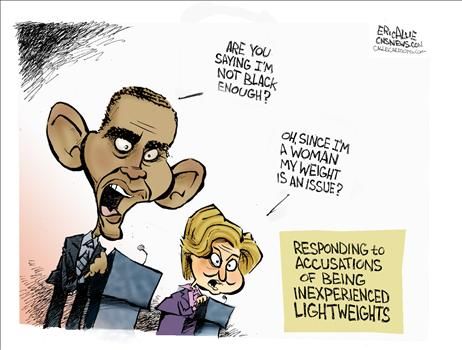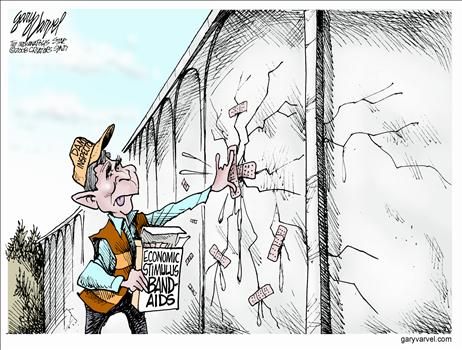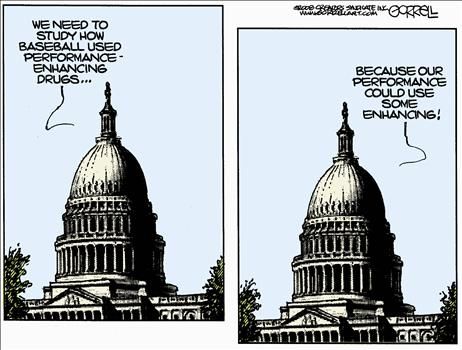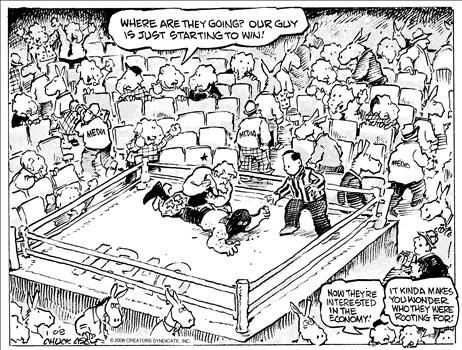Remember the Energy Bill that Congress recently passed? Well, what is it going to achieve and what will it cost us? Will is even achieve its own stated goals of higher fuel efficieny standards and lower emissions? Not according to Investor's Business Daily:
The new energy law contains stiff new fuel-efficiency standards for U.S. automakers. But make no mistake: What you got from Congress was a big tax hike. Just ask General Motors Vice Chairman Bob Lutz.
That's right. The CAFE standards embedded in the Energy Independence Act require fuel efficiency to jump to a fleet average 35 miles a gallon in 2020 from about 25 mpg now. That means you will soon be paying more — a lot more — to buy a car.
Maybe this sounds reasonable. To many, these new rules are long overdue. They'll help us cut our reliance on foreign oil, they say, while reducing global warming. Who could disagree with such noble goals?
The only problem is, based on what we know now, it'll cost automakers some $85 billion to comply. When all costs are factored in, other estimates put the total cost at about $18 billion a year.
Fine, say the populist politicians. Stick it to the automakers. But do they really think Ford and GM will pick up the tab? Of course not. It'll be you, as GM's Lutz made clear in comments Sunday.
|
Absolutely correct. It will be the consumer who will have to pay the higher prices. And remember that higher prices always have a ripple effect throughout the economy. Higher prices on one commodity lead to higher prices on others. If transportation costs go up, so do the prices of transporting things like food which in turn drives food prices up.
The article goes on:
New fuel-efficiency standards are supposed to clean up the air by encouraging people to drive cleaner cars, saving four million barrels of imported oil a day. This, too, sounds great. But like so many things that sound good in theory, it suffers when translated into reality.
In fact, the higher prices of cars will encourage consumers to keep their older, dirtier but cheaper vehicles for much longer. So the actual benefits will be less than forecast.
History bears this out. In 1970, just before the first CAFE standards were imposed, the average car on the road was about 5 1/2 years old. By 2000, the average car was 9 years old — thanks to the higher costs of buying and operating new cars, a direct result of higher fuel efficiency and safety standards.
That's not the only negative impact. One way manufacturers can more easily meet the tough new standards is by making smaller cars. That's why cars in Europe — cited by many fuel-efficiency proponents as a model for the U.S. — are so tiny.
Smaller cars are cute and oh-so-European, we agree. But they're also quite dangerous. That's why cars are so big and heavy today: They have lots of safety equipment and padding that makes them much safer than the econo-boxes of the 1980s.
|
Of course, no one in the Democrat majority of Congress thought about any of this when they were voting to "stick it" to the automakers, but we've come to expect that from a party that embraces failed left-wing socialist policies.
Finally:
So this is what Congress in all its wisdom has brought us: A 21% tax hike on cars, coupled with an official policy that could kill as many Americans in one year as have been killed so far in five years of the Iraq War. Some energy policy.
Yet on the stump, Hillary Clinton, Barack Obama and John McCain have all supported the new standards. In doing so, they punish a relatively small group of Americans — new-car drivers, auto industry workers and auto-industry shareholders — to benefit the rest of us. This is unfair.
It's also bad economics, which is a typical outcome of congressional meddling. Through shortsighted, feel-good policies and excessive regulation, our government continues to drive up the prices of many things — oil, food, cars and homes among them. Then it blames others — stupid consumers, greedy businesses, shady foreign operators — for the bad results.
It's time for some truth. The new CAFE standards, as Lutz suggests, amount to a tax — a rather narrow and inefficient one that will neither reduce our reliance on foreign oil nor curb global warming. It will, however, make us a lot less safe and well-off. |
Another Central Planning Policy that will do nothing but make life hard on the average American while Congress enjoys lavish junkets and vacations at our expense.
You can access the complete article on-line here:
The Tax They Didn't Tell You AboutInvestor's Business Daily
January 14, 2008
The "Old Gray Lady" must be getting senile and hoping that the average reader is suffering from dementia as well, or at least a short memory. The
New York Post exposes the
Times for some shoddy journalism and blatent lies about America's military veterans:
Memo to New York Times Public Ed itor Clark Hoyt: Your urgent atten tion is needed on the slanderous 7,000-word front-page article published last Sunday about homicides allegedly committed by US veterans of the Iraq and Afghanistan campaigns.
...
As our colleague Ralph Peters so adroitly demonstrated on these pages Tuesday, the article embraced the hoariest of overwrought clichés - the US combat vet as psychotic killer.
But on what evidence?
None at all.
...
The article, said to be the first of several, reports that there have been 121 homicides involving active-duty or recently discharged Iraq/Afghan combat veterans.
|
But there is one problem. The author's of the
Times article didn't really do any research nor did they crunch the numbers or do a proper analysis. Fortunately, the
New York Post did:
As Peters noted, "to match the homicide rate of their [nonmilitary] peers, our troops would've had to come home and commit about 150 murders a year, for a total of 700 to 750 murders between 2003 and the end of 2007" - six times the number the Times cited.
That estimate is borne out by University of Pennsylvania political scientist John DiIulio, who notes on the Weekly Standard's Web site that 749,932 veterans of Iraq and Afghanistan had been discharged by the end of 2007. Apply that to the 121 killings cited by the Times, and the homicide rate works out to 16.1 per 100,000 - over the entire six-year period.
By way of imperfect comparison, the US Bureau of Justice Statistics' most recent numbers demonstrate that the same rate among males ages 18-24 was 26.5 - 65 percent higher - for a single year, 2005.
It's not necessary to extrapolate that stat to understand that the Times has slandered some fine young Americans.
For none of those numbers appeared among the 7,000 words the paper published. Which means that the numbingly long piece, while loaded with affecting details, contained nothing that would place these cases in any sort of meaningful context.
|
But then, what did you really expect from a rag that exposes classified programs so that the terrorists can learn what governments like the United States are doing to protect their citizens?
You can access the complete article on-line here:
The Killer Vet LieNew York Post
January 17, 2008

And the
Telegraph has an interesting piece about the high-tax policies of the British Government. It appears as though Great Britain is sliding down the ranks from a "free economy" to "mostly free economy." (Is that anything like Earth going from "harmless" to "mostly harmless?" according to the Encyclopaedia Galactica?)
Anyway, Ambrose Evans-Pritchard has this to say:
Britain has slipped out of the ranks of fully "free" countries in this year's Heritage Index of Economic Freedom, reflecting the sharp rise in the tax burden and ballooning state sector.
...
The country has continued to slide down the league under Gordon Brown's economic management, falling from fifth to tenth place over the last two years. It has been overtaken by Canada, Chile, Switzerland, Australia, and the United States.
Britain now scores below 80 points on a range of key indicators, dropping into the "mostly free" camp with Germany, Japan, Bahrain, Armenia and Trinidad.
Two eurozone shockers are Italy (64), and Greece (80), now ranked lowered than most of the old Communist bloc.
The ever harsher verdict on Britain comes as Mr Brown's tax and spend policies begin to reshape the basic structure of the UK plc, transforming it from one of Europe's leanest fiscal states to one of the most bloated.
"Total government expenditures, including consumption and transfer payments, are very high. Government spending has been rising since the 1990s and in the most recent year equaled 44.7 percent of GDP," said the UK country report.
|
The Heritage Index defines economic freedom as "the absence of constraint on the production, distribution or consumption of goods and services beyond the extent necessary for citizens to protect and maintain liberty itself".
Many European states, most notably Germany, have been trimming down the government's involvement in private sector economy. Great Britain has been increasing it and now it is beginning to hurt.
No nation has ever taxed itself into prosperity, but many have taxed themselves into poverty. Einstein once remarked that the definition of insanity is doing the same thing over and over while expecting adifferent result. Levying high taxes on the means of production, even though leftists claim it is a good thing, has only led to economic slow-down. So, why do leftists continue to push for high taxes thinking it will help and economy grow?
You don't need to be Einstein to figure that one out.
You can access the complete article on-line here:
High-Tax Britain Booted From Club Of 'Free' EconomiesAmbrose Evans-Pritchard, International Business Editor
The Telegraph
January 16, 2008
And this is why we don't trust polls:

















